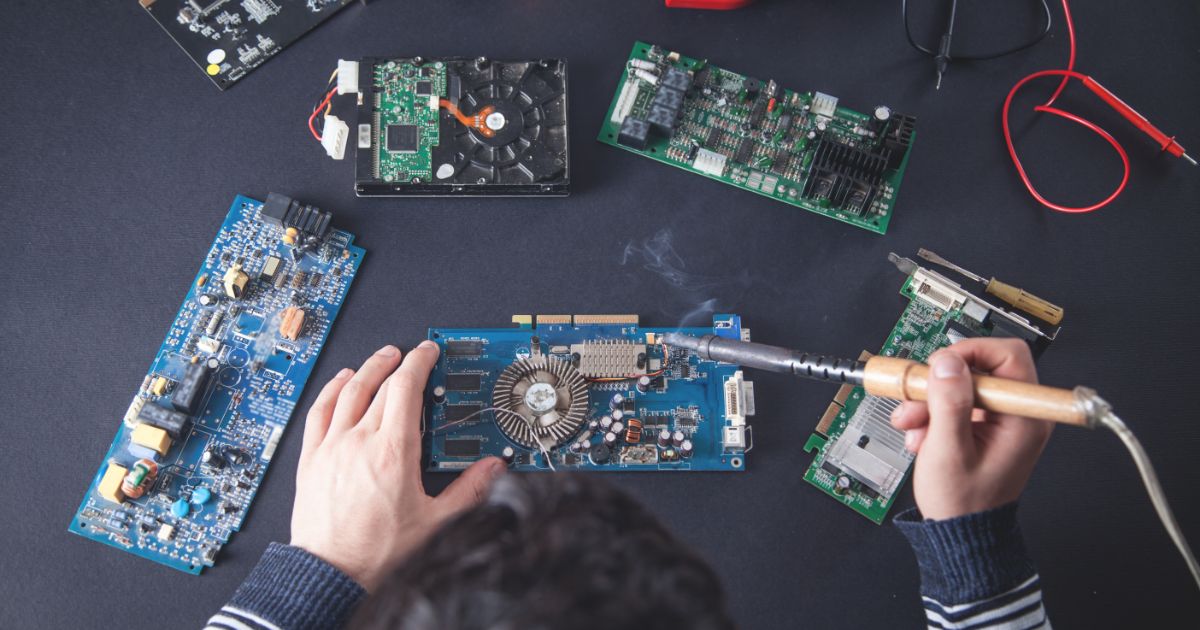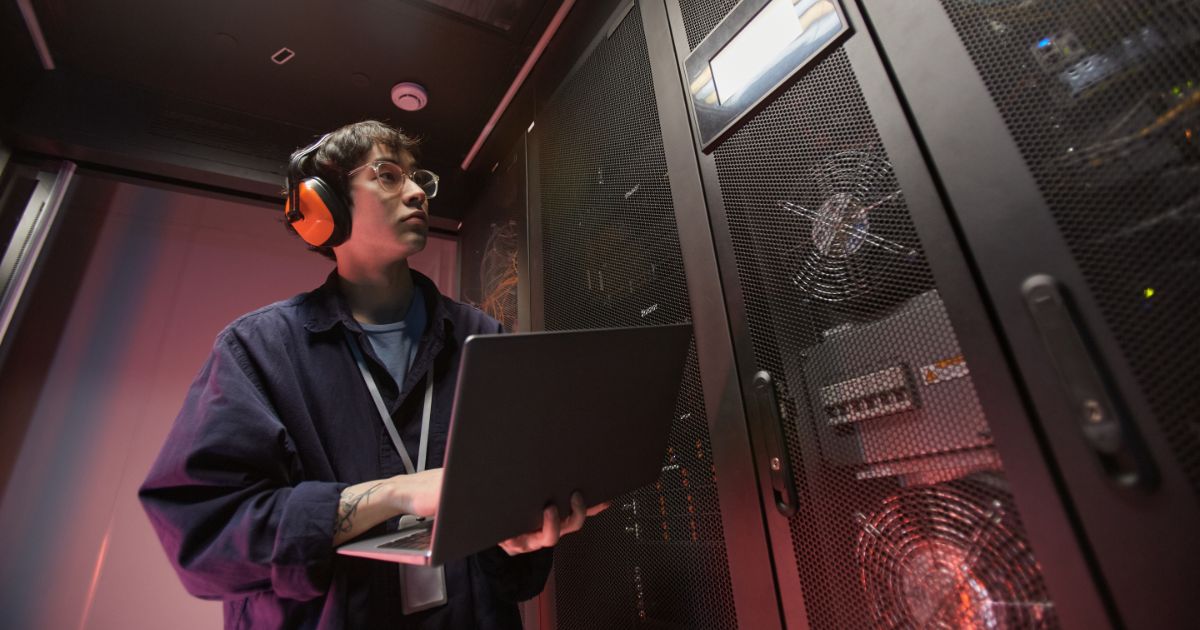What is a Computer Hardware Engineer? Duties & Career Paths
Today's ever-evolving technology further affirms the prominent role of Computer Hardware Engineers, who lay the foundation for innovation and progress. They play an important position in various fields, from the smartphones in our pockets to the supercomputers powering scientific breakthroughs. The undeniable truth is that the digital world relies on complex hardware systems. These professionals are the architects behind the physical components of our digital world, designing, developing, and testing the hardware that powers everything.
Do you know what exactly does a Computer Hardware Engineer do? And how does one embark on this fascinating career path? In this article, we will delve into the world of Computer Hardware Engineering, exploring the essential duties of these engineers and the steps you can take to become a successful Computer Hardware Engineer.
What is a Computer Hardware Engineer?

A Computer Hardware Engineer designs, develops, and tests physical components of computers or related systems, such as processors, circuit boards, memory devices, networks, and routers. They create blueprints, work with computer software to simulate designs, build prototypes, and conduct rigorous testing. Hardware engineers also collaborate with software developers to seamless integration between hardware and software, as well as keep abreast of technological advancements to innovate.
What Does a Computer Hardware Engineer Do?
A Computer Hardware Engineer is responsible for designing, developing, and testing computer hardware components. Here is a detailed look at what they do:
Design and Development

Computer Hardware engineers design blueprints by developing detailed schematics that outline the structure of the hardware components. This step often uses computer-aided design (CAD) software to create precise designs that serve as the foundation for further development.
The focus here is on optimizing performance, power consumption, and cost-effectiveness to create efficient high-performing hardware. Each design must meet specific requirements and constraints while also pushing the boundaries of current technology.
Prototyping
Prototyping is a phase where Computer Hardware engineers transform designs into physical models to test their practicality. During this stage, engineers build and assemble prototypes of the hardware components they've designed. These prototypes serve as tangible representations of their ideas, which provide an opportunity to evaluate and refine the design before mass production.
Prototyping shows Computer Hardware engineers how the components fit together, how they interact, and whether any unforeseen challenges arise. This process is essential for identifying potential improvements to make the final hardware product both functional and manufacturable.
Testing and Analysis
Functional testing is where engineers evaluate the basic operation of the hardware, so it works as intended. They check the hardware's ability to perform its designed functions and identify any immediate issues or malfunctions.
Following functional testing, engineers conduct performance testing. This step assesses how well the hardware performs under various conditions, including different loads, temperatures, and environmental factors. Engineers use specialized equipment combined with software tools to simulate real-world scenarios.
Another essential aspect of testing is compatibility testing. The new hardware components need to be compatible with existing systems and software. It leads to the hardware can be successfully deployed in the intended environment without causing conflicts or issues.
Analysis and optimization are integral to refining the hardware design. Engineers review the test results to identify any weaknesses or areas that need enhancement. They then make iterative changes to the design, re-testing and re-analyzing until the hardware meets all performance criteria.
Collaboration
Effective collaboration is working closely with various teams and departments to achieve an effective end product.
Working with Software Engineers: Hardware and software must work seamlessly together for any computer system to function correctly. Hardware engineers collaborate with software engineers to create compatibility between hardware components and software applications. They collaborate to share design specifications, coordinate on interface standards, and conduct joint testing to resolve any issues that may arise.
Manufacturing: Engineers work with manufacturing experts to select appropriate materials, design for manufacturability, and develop production processes that maintain quality while controlling costs.
Marketing and Management: Collaboration with the marketing and management teams helps align hardware development with business objectives and market needs. Based on knowledge of customer requirements and market trends, hardware engineers can design products that meet user expectations.
Documentation and Reporting
Reports summarizing the results present a thorough presentation of the data collected during testing, containing performance metrics, reliability assessments, and any issues identified. Engineers provide an analysis of the test results, interpreting the data to identify strengths and weaknesses to show areas for improvement. Based on the test results and analysis, engineers make recommendations for design modifications, additional testing, or other actions needed to address any issues.
How to Become a Computer Hardware Engineer?

Becoming a computer hardware engineer is an exciting career path for those interested in designing and developing computer systems with components. Here’s a comprehensive guide on how to become a computer hardware engineer:
Step 1 - Develop a Strong Educational Foundation
Whether through traditional degree programs, vocational training, or continuous learning, education helps individuals achieve their career goals and adapt to the ever-changing job market.
High School Preparation
Focus on STEM Subjects: Take courses in mathematics, physics, computer science, and electronics. These subjects provide a strong foundation for understanding hardware concepts.
Participate in Science Clubs or Competitions: Join technology or engineering clubs to gain hands-on experience and foster problem-solving skills.
Pursue a Bachelor’s Degree
A bachelor's degree is typically the minimum requirement to enter the field of computer hardware engineering. Most employers require a degree in computer engineering, electrical engineering, or a related field. These programs cover essential topics like circuit design, microprocessors, digital systems, and computer architecture.
Let's ensure that the degree program is accredited by relevant engineering bodies, such as ABET (Accreditation Board for Engineering and Technology) in the United States, to meet industry standards.
It would help if you focused on the Core Courses:
Digital Design: Understanding digital circuits and systems.
Microprocessors and Microcontrollers: Study of processing units and their applications.
Computer Architecture: Design and analysis of computer systems.
Embedded Systems: Integration of hardware and software in computing devices.
Electronics and Circuit Theory: Basics of electronic components and circuitry.
Signals and Systems: Analysis of signal processing and communication systems.
Consider a Master’s Degree (Optional)
While not always required, a master’s degree can open up more advanced opportunities and specialized roles in computer hardware engineering. You should consider specializing in areas like microelectronics, robotics, telecommunications, or computer networks. One outstanding advantage is a master’s program often has research projects that can lead to innovations in hardware technology.
Step 2 - Gain Practical Experience
Even small steps can make a significant difference. Start by identifying opportunities that align with your career goals and gradually build your experience.
Internships and Co-op Programs
Internships provide practical experience and exposure to real-world engineering challenges. They often lead to job offers and help build a professional network. Going through a short period, you can significantly enhance your career prospects and gain valuable experience that will set you apart from other job seekers.
Some universities offer cooperative education programs that alternate classroom learning with practical work experience. Take this advantage to start your journey.
Participate in Projects and Competitions
Participate in competitions like robotics challenges, hackathons, or hardware design contests to showcase skills and creativity. Another effective way is working on group projects intensifies teamwork skills and provides experience in collaborative engineering tasks.
Build Personal Projects
Create your own electronics projects or modify existing hardware to gain hands-on experience and build a portfolio. We recommend that platforms like Arduino, Raspberry Pi, or FPGA boards are excellent for experimenting with hardware design and prototyping.
Step 3 - Acquire Necessary Technical Skills
The specific skills you need will vary depending on your desired career path. Let's tailor your learning to your specific goals.
Key Technical Skills
If you develop technical skills, you are well-equipped to design, develop, and maintain advanced hardware systems.
Circuit Design and Analysis: Ability to design and analyze electronic circuits and systems.
Computer Architecture: Understanding of computer system design and functionality.
Programming Skills: Familiarity with programming languages like C/C++, Python, or Verilog for hardware interfacing and control.
CAD Software: Proficiency in computer-aided design (CAD) tools for creating hardware schematics and layouts (e.g., Altium Designer, AutoCAD Electrical).
Embedded Systems: Knowledge of embedded systems development and integration.
Networking and Communication Protocols: Understanding of network protocols and hardware communication standards (e.g., Ethernet, PCIe, USB).
Problem-solving and Analytical Skills: Ability to troubleshoot and solve complex hardware issues.
Soft Skills
While technical skills are essential for a computer hardware engineer, soft skills are equally important for career success.
Communication Skills: Ability to effectively communicate technical information to non-engineers and collaborate with team members.
Project Management: Skills in planning, organizing, and executing engineering projects.
Attention to Detail: Precision in design and testing to warrant hardware functionality and reliability.
Continuous Learning: Stay updated with technological advancements with industry trends.
Step 4 - Obtain Certifications (Optional but Beneficial)
Certifications can enhance your credentials and demonstrate expertise in specific areas of computer hardware engineering. Some relevant certifications include:
Certified Hardware Engineer (CHE): Offered by ETA International, this certification validates skills in computer hardware design and maintenance.
Cisco Certified Network Associate (CCNA): A certification for those interested in networking hardware and infrastructure.
CompTIA A+ Certification: Focuses on IT support and troubleshooting, including hardware installation and configuration.
Microsoft Certified: Azure Solutions Architect Expert: For those studying cloud computing and hardware integration.
Conclusion
Computer hardware engineers are the unsung architects of the digital world. Their work, while often unseen, is fundamental to the functioning of every electronic device we use.
As technology continues to advance at an unprecedented pace, the demand for skilled hardware engineers is only expected to grow. Those who choose this career path have the opportunity to make significant contributions to industries ranging from consumer electronics to aerospace and beyond.
To become a professional Computer hardware engineer, you need more than just general information. Sign up for Skilltrans courses today to equip yourself with the most essential skills.

Meet Hoang Duyen, an experienced SEO Specialist with a proven track record in driving organic growth and boosting online visibility. She has honed her skills in keyword research, on-page optimization, and technical SEO. Her expertise lies in crafting data-driven strategies that not only improve search engine rankings but also deliver tangible results for businesses.



